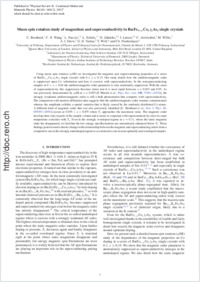Muon spin rotation study of magnetism and superconductivity in Ba(Fe1−xCox)₂As₂ single crystals
- Bernhard, Christian University of Fribourg, Department of Physics and Fribourg Centre for Nanomaterials, Switzerland
- Wang, Chen Nan University of Fribourg, Department of Physics and Fribourg Centre for Nanomaterials, Switzerland
- Nuccio, Laura University of Fribourg, Department of Physics and Fribourg Centre for Nanomaterials, Switzerland - Queen Mary University of London, School of Physics and Astronomy, United Kingdom
- Schulz, Leander University of Fribourg, Department of Physics and Fribourg Centre for Nanomaterials, Switzerland
- Zaharko, O. Laboratory for Neutron Scattering, Paul Scherrer Institut, Villigen, Switzerland - Department of Physics, Technical University of Denmark, Lyngby, Denmark
- Larsen, J. Laboratory for Neutron Scattering, Paul Scherrer Institut, Villigen, Switzerland - Department of Physics, Technical University of Denmark, Lyngby, Denmark
- Aristizabal, C. Queen Mary University of London, School of Physics and Astronomy, United Kingdom
- Willis, M. Queen Mary University of London, School of Physics and Astronomy, United Kingdom
- Drew, Alan J. Queen Mary University of London, School of Physics and Astronomy, United Kingdom
- Varma, G. D. Department of Physics, Indian Institute of Technology Roorkee, India
- Wolf, T. Karlsruher Institut für Technologie, Institut für Festkörperphysik, Karlsruhe, Germany
- Niedermayer, Ch. Laboratory for Neutron Scattering, Paul Scherrer Institut, Villigen, Switzerland
-
19.10.2012
Published in:
- Physical Review B - Condensed Matter and Materials Physics. - 2012, vol. 86, no. 14, p. 144112
English
Using muon spin rotation (μSR) we investigated the magnetic and superconducting properties of a series of Ba(Fe1−xCox)₂As₂ single crystals with 0≤x≤0.15. Our study details how the antiferromagnetic order is suppressed upon Co substitution and how it coexists with superconductivity. In the nonsuperconducting samples at 0c approaches the maximum value. The magnetic order develops here only in parts of the sample volume and it seems to cooperate with superconductivity since its onset temperature coincides with Tc. Even in the strongly overdoped regime at x = 0.11, where the static magnetic order has disappeared, we find that the low-energy spin fluctuations are anomalously enhanced below Tc. These findings point toward a drastic change in the relationship between the magnetic and superconducting orders from a competitive one in the strongly underdoped regime to a constructive one in near-optimally and overdoped samples.
- Faculty
- Faculté des sciences et de médecine
- Department
- Département de Physique
- Language
-
- English
- Classification
- Physics
- License
-
License undefined
- Identifiers
-
- RERO DOC 31083
- DOI 10.1103/PhysRevB.86.184509
- Persistent URL
- https://folia.unifr.ch/unifr/documents/302716
Statistics
Document views: 141
File downloads:
- pdf: 158
